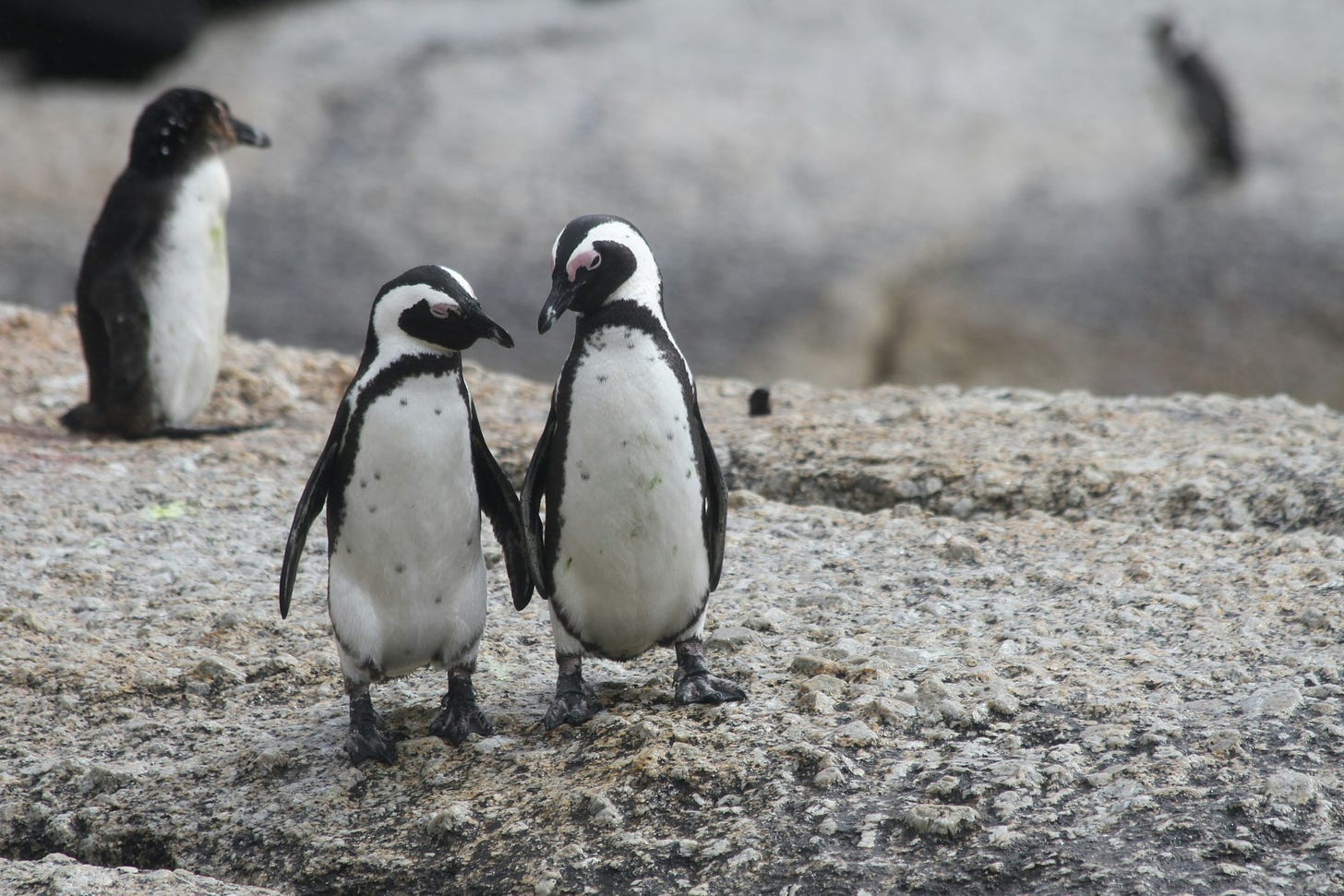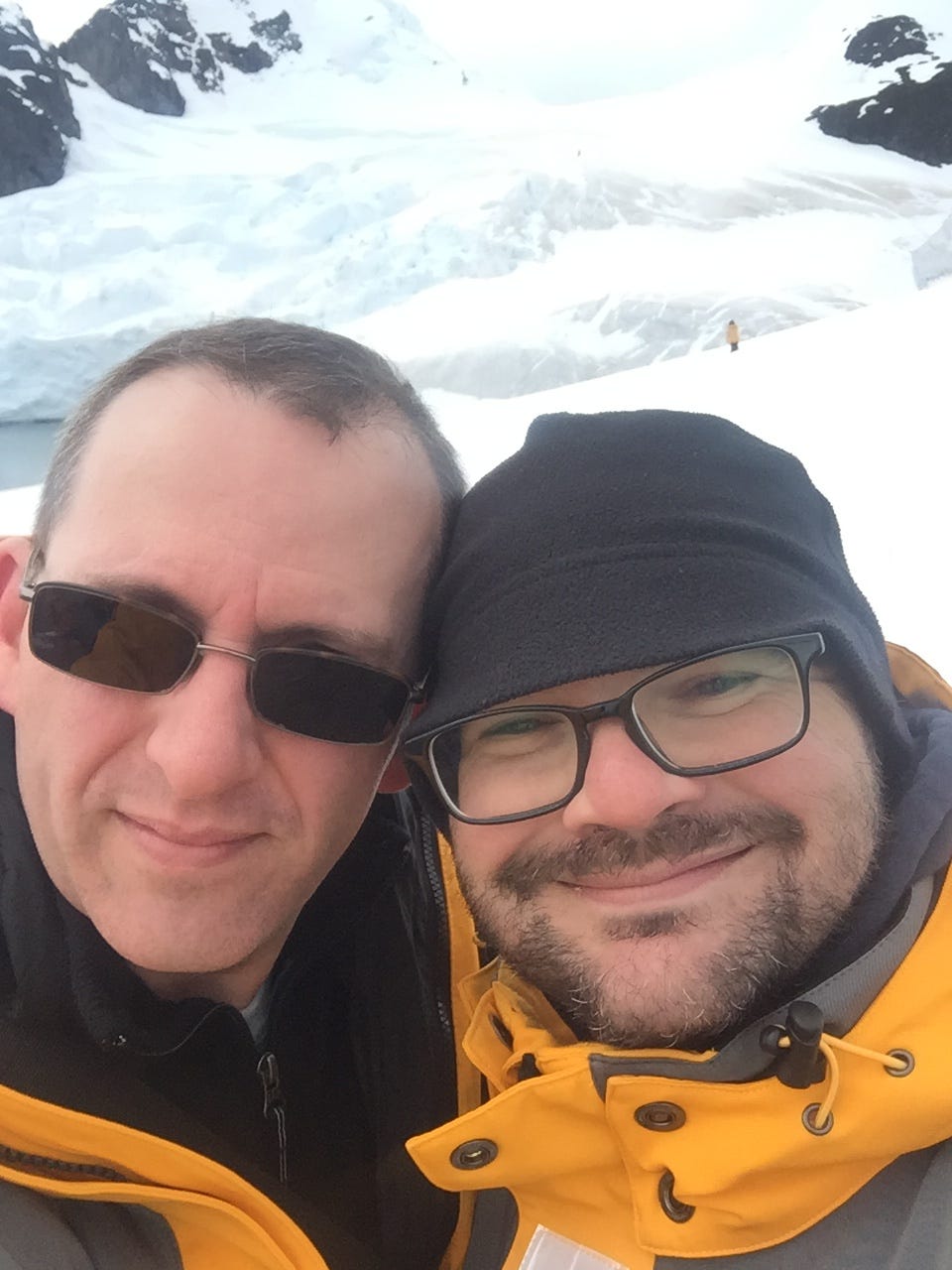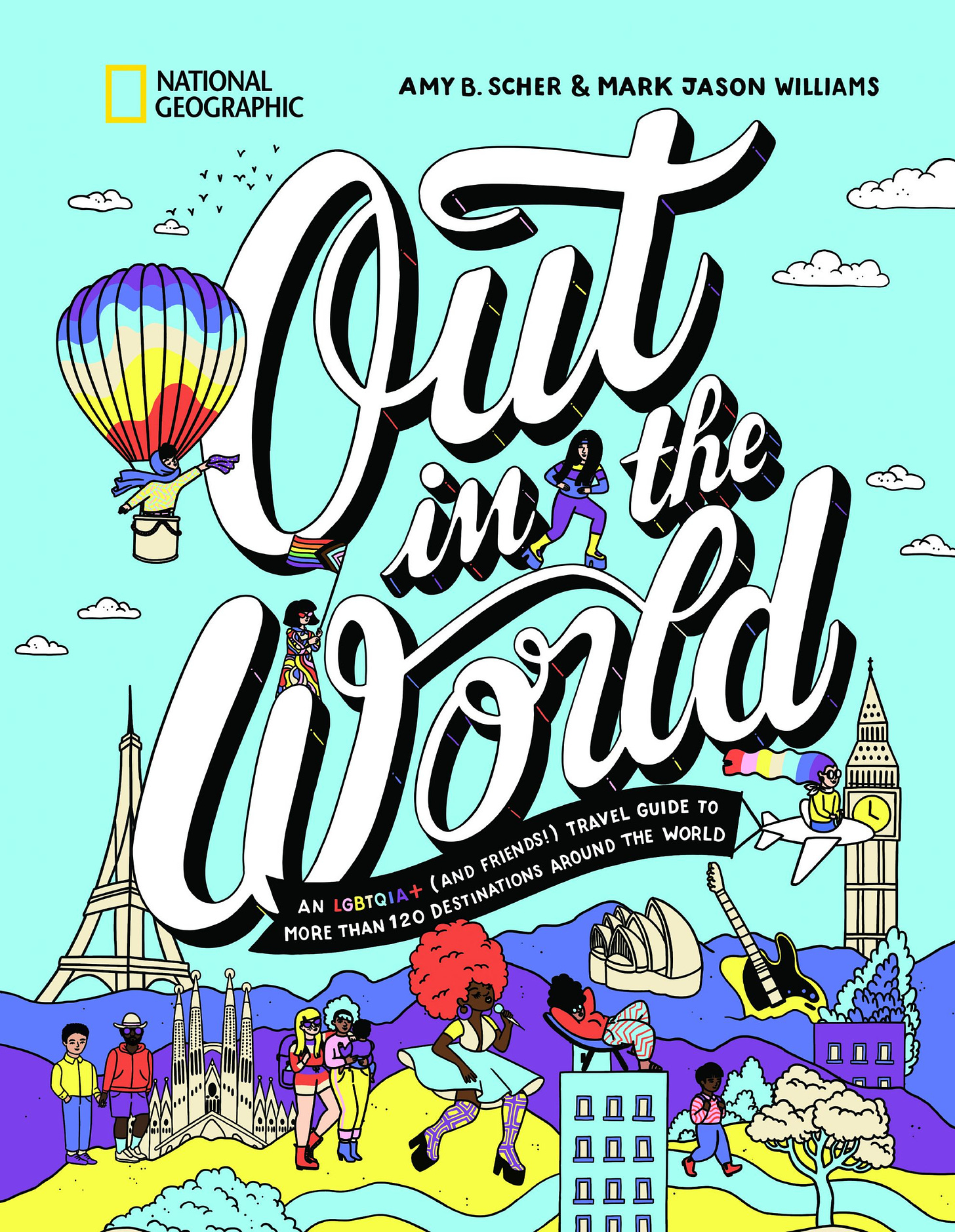Recovery at the End of the World
From my hospital room as a kid, I always fantasized about going to Antarctica, but as an adult on honeymoon there, could I learn to chill?
Each week, The Queer Love Project publishes an original essay. Want to submit your essay and add to our growing archive? Find our submission guidelines and more here.
“Why can’t I go to Disney World like my friends?” I asked my mother, frustrated that everyone I knew was off having fun while I spent my summer vacation confined to a pediatric cancer center in the Bronx.
“We’ll go when you’re better,” she told me.
“I feel fine,” I lied, ignoring my high fever and all of the tubes attached to my body.
Mom pressed her lips to my forehead and called my bluff.
“Maybe next summer,” she told me.
I was skeptical. After three years of chemotherapy, my illness hadn’t improved. Sometimes it felt like I wouldn’t see my eighth birthday, let alone sunny Florida. Yet Mom refused to let me sulk.
“How about some pizza?” she asked. “This hospital food sure isn’t going to work any miracles.”
I nodded yes. Mom left the room and returned 10 minutes later with a slice of extra cheese—and a promise.
“Forget Disney World, because we’re aiming bigger,” she explained. “Pick any place you like and I promise to take you there someday.”
“Antarctica,” I said, remembering we’d just watched a documentary about it on PBS.
“The South Pole it is,” Mom gushed. “We’ll march with the penguins.”
I perked up. Mom and I loved watching the birds at the Bronx Zoo. As a kid who was bottom-heavy and kind of a klutz, I related to the way they waddled and constantly fell over.
Mom wasn’t a traveler. She didn’t own a passport and didn’t even like going to Manhattan, only 30 minutes from our Yonkers home. Yet the next day, she returned with a stack of library books. During blood transfusions, we read about sprawling glaciers, playful seals, and dead explorers. After an unexpected recovery, I asked Mom to take me to Antarctica for my ninth birthday.
“We can’t afford it yet, honey,” she told me.
I was disappointed but understood. Mom worked part-time at a video store and my father was a construction worker. I had no idea how much a trip like this cost, but knew that having four kids—including one with huge medical bills—didn’t leave much extra money for luxuries. Still, Mom kept encouraging me to see the world. On Sundays, when my father and older sisters watched football, she and I rolled meatballs and fantasized about visiting the Roman Coliseum and the Great Wall of China. On my 18th birthday, she gave me a travel journal.
“For all of your adventures,” she told me. “I can’t wait to hear about them.”
“I thought we were going to see the world together?” I asked.
“I don’t know about those long plane rides or being away from home for so long,” she confessed. “It’s better that you go with someone else.”
“Who?” I wondered.
“You know, a special someone,” she said.
I liked the idea, and immediately pictured strolling along the Champs Élysées arm-in-arm with a Ricky Martin look-alike. Yet three years later, at 21, I’d gotten as far as a Greyhound to Baltimore to be a plus one at a wedding. I’d later find my date pants down in the backseat of a Prius with his ex, asking for Balti-more, more, more.
I finally made it to Paris when I was 25, but traveled alone and was miserable. I was so desperate for company that I went to a porno movie theater, but I got bored because all the movies were in French and I couldn’t follow the storylines. Eventually, someone reached into my jeans, and I didn’t say no. But I was later disappointed to learn that his name was Jeff, and he was from Michigan, not the Gaston from Bordeaux that I’d imagined him to be.
This is pretty much how all of my travels went over the next 30 years—until I found Michael online. Unlike other guys, he didn’t post a bunch of gym selfies or claim to be looking for a soul mate. Instead, he wrote about his journeys across the world and all seven continents. Enamored, I sent him a message.
“Even Antarctica?” I asked, hating myself for including a smiley face.
“Yep,” he replied.
It wasn’t romance novel material, but we met in person a month later. Over a casual hamburger dinner in Harlem, we skipped the small talk and spent most of the night discussing Michael’s trek to the South Pole.
“I’m jealous,” I admitted halfway into the meal. “It’s my dream to see all seven continents.”
“I’d go back with you,” he said.
I wrote it off as first-date flirting. I’d also been promised this trip before and didn’t want to be let down again.
I never expected that three years later Michael and I would be married and planning our honeymoon. I suggested Hawaii. He wanted something more unconventional.
“Let’s go to the end of the world,” he said.
I was excited but worried about how we’d pay for a trip like this. Like my parents, Michael and I lived on modest incomes. He taught at a city college, and I worked as a file clerk in a law firm.
“I’ll find a way,” he said. “Being there once was incredible. Going with you will be even better.”
True to his word, Michael went into deal-watching overdrive. He combed the internet for six months and eventually found a cruise to Antarctica at a heavily discounted price.
“I hope it’s not named the Titanic,” I joked.
“The trip also includes all flights, meals, and gratuities,” noticed Michael. “That makes it even more worth it.”
For the first time in our relationship, his pragmatism excited me. When we decided we could swing it, I called Mom and asked her to come along.
“Don’t be stupid, this is your honeymoon,” she said.
The night before we left, I stayed up late making a PowerPoint presentation about what we should see and do on our expedition.
“Let the journey guide you, not the other way around,” Michael urged.
“Stop waxing poetic and help me learn about these different kinds of penguins,” I said.
I should have listened to him. A tightly wound New Yorker who’d never really learned how to go with the flow, I had a meltdown when our flight to Argentina, where our cruise departed from, was delayed.
Once we arrived at our hotel in Ushuaia, we learned the ship would be late leaving, too.
“What? How long?” I fretted.
“A few hours, maybe a day or two,” our tour guide explained.
Michael was amazingly calm, which I found super irritating. I went for a walk in downtown Ushuaia, which was the size of a New York City block and filled with tacky tourist shops and chain restaurants. I settled on the Hard Rock Cafe before returning to the hotel, where I found Michael pacing by the door.
“What’s wrong? Another delay?” I asked
“No, it’s your mom. She’s in the hospital,” he said.
My sister had called him while I was out. She didn’t have all of the information, but when I heard the phrase “possible stroke,” I freaked out.
“We don’t have to get on the ship,’ said Michael. “We can go back home if you want.”
I felt conflicted. We’d come all this way, but I was concerned about Mom. Michael suggested we call her. Before I could even ask how she was doing, Mom said, “I told your sister not to call you. Don’t even think about coming home.”
“I’m worried,” I confessed.
“Mark, your sickness once stood in the way of you seeing the world. Whatever is happening with me sure as hell won’t,” she said.
I agreed, hesitantly, to get on the ship. Once it took off, it was far from smooth sailing. The tumultuous Drake Passage turned Michael’s stomach and my sea-sickness pills made me hallucinate.
“Is this what acid feels like?” I asked.
“How would I know?” said Michael, who’d never even smoked a joint.
“You don’t have to be so rude,” I snapped, peering out the window at flying rainbow dolphins. In the middle of nowhere and confined to our tiny cabin, without the internet or television to occupy our time, Michael and I passed the time by sleeping, running to the bathroom, or bickering. It was far from the romantic honeymoon I imagined. Then, seemingly out of nowhere, I saw a gleaming white landmass.
“Welcome to Antarctica,” said Michael, caressing my shoulder.
I felt euphoric. Until the next day, when we cruised along in small zodiac boats, and I fell in the water.
“I’m going to freeze to death or be swallowed by a whale,” I thought, floating belly-up. I’d hoped Michael would save me, but he was too busy gawking at seals and icebergs to notice I was gone. Instead, my hero was Jane, an 86-year-old grandmother of six, who swam toward me with perfect strokes while I awkwardly flapped my arms like a seal having a temper tantrum. I was grateful she’d saved me, yet mortified that she was in much better shape. Back on board the boat, Michael offered me dry gloves as a consolation prize. A cold wind shimmied through my spine and then slapped me across the face, and I wondered why I’d wanted to come here so bad.
I felt like the trip was ruined. I wanted to stay on our bigger ship. It had handrails and lots of booze. Like my mother, Michael refused to let me mope.
With his help, I fought my negativity. I marveled at enormous icebergs, which looked like they’d been carved by a master sculptor. I spent hours observing my favorite black-and-white birds. I giggled like when I was younger as they hopped rocks and slid belly first down snowy hills. Still, I felt off. I did my best to appreciate these unique experiences, but something gnawed on me. One night, when Michael felt a bit sick and wanted an early bedtime, I snapped.
“I had plans for us and now the night is ruined,” I shouted like a spoiled kid.
“Well, some things are beyond your control,” he said.
Then it hit me. This was the first vacation I’d taken where I didn’t have control over anything—all of our activities were determined by the ship crew and the weather, which didn’t always cooperate. I realized the last time I felt this helpless was when I was a kid in the hospital, and that I was still carrying PTSD from my illness. Yet now, with nothing in the distance and nowhere to go, I had to learn to stop looking so far ahead and appreciate where I was.
My mood shifted. When the weather turned ugly and we missed a shore landing, I resisted stewing and joined in a communal game of Trivial Pursuit. I didn’t fret over being too slow to get perfect photos and agreed to trade afternoon cocktails for a long hike on a volcano, where I huffed and puffed but minimized the outward complaining. I once again fell off the zodiac boat, but this time laughed it off.
We rang in the New Year by dancing next to glaciers until 3 a.m., the sun still bright. I enjoyed seeing seals, orcas, and whales. We were close enough to a humpback to feel the mist from her blow and listen to her breathe. To my surprise, I started crying. Here, at the end of the world, I joined the whale in a deep breath, finally feeling a sense of healing.
When I returned home, Mom was out of the hospital and feeling much better. Over a heaping plate of homemade manicotti, I told her about our trip.
“I’m so happy Michael took such great care of you,” she said.
Though well-intentioned, her comment struck a nerve. I was an adult in my forties who’d been (mostly) fine on his own for two decades—did I really need someone to take care of me? Fuck. Maybe Antarctica hadn’t healed me after all.
“I don’t need to take care of you,” said Michael, when I asked him his opinion. “But I like doing it.”
“What if I get too dependent on you?”
“Why is depending on someone a bad thing?”
It would take a whole other trip, to Sydney—bickering in front of the Opera House when Michael could tell I was too hangry to do more sight-seeing—until I finally realized he was right. Maybe I’d always feel a bit insecure about someone taking care of me, but I saw then, calmly sipping flat whites in a cafe, how much I loved Michael and how grateful I was to share a life and suitcase. I began to understand the difference between being a sick kid dependent on doctors to save my life and having a husband who just wants to help me wipe coffee from my sleeve (because, of course, I spilled mine).
“Thanks for taking care of me, at home and everywhere we go,” I said to him then, letting out another whale-like exhale, and feeling like, though I hadn’t moved a muscle, I was now one step closer to seeing the world.
Mark Jason Williams is the co-author of Out in the World: An LGBTQIA+ (and Friends!) Travel Guide to More Than 100 Destinations Around the World, available to buy here.









Great story, thanks for sharing, Mark!